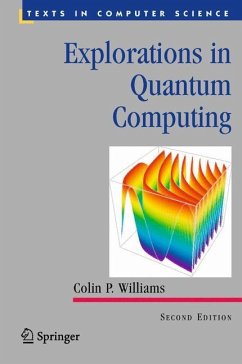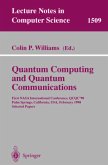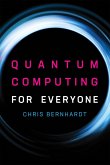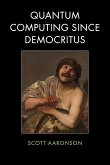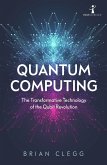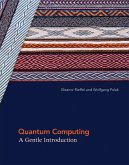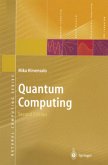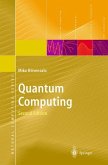By the year 2020, the basic memory components of a computer will be the size of individual atoms. At such scales, the current theory of computation will become invalid."Quantum computing" is reinventing the foundations of computer science and information theory in a way that is consistent with quantum physics - the most accurate model of reality currently known. Remarkably, this theory predicts that quantum computers can perform certain tasks breathtakingly faster than classical computers - and, better yet, can accomplish mind-boggling feats such as teleporting information, breaking supposedly "unbreakable" codes, generating true random numbers, and communicating with messages that betray the presence of eavesdropping.This widely anticipated second edition of Explorations in Quantum Computing explains these burgeoning developments in simple terms, and describes the key technological hurdles that must be overcome to make quantum computers a reality. This easy-to-read, time-tested, and comprehensive textbook provides a fresh perspective on the capabilities of quantum computers, and supplies readers with the tools necessary to make their own foray into this exciting field.Topics and features: concludes each chapter with exercises and a summary of the material covered; provides an introduction to the basic mathematical formalism of quantum computing, and the quantum effects that can be harnessed for non-classical computation; discusses the concepts of quantum gates, entangling power, quantum circuits, quantum Fourier, wavelet, and cosine transforms, and quantum universality, computability, and complexity; examines the potential applications of quantum computers in areas such as search, code-breaking, solving NP-Complete problems, quantum simulation, quantum chemistry, and mathematics; investigates the uses of quantum information, including quantum teleportation, superdense coding, quantum data compression, quantum cloning, quantum negation, and quantumcryptography; reviews the advancements made towards practical quantum computers, covering developments in quantum error correction and avoidance, and alternative models of quantum computation.This text/reference is ideal for anyone wishing to learn more about this incredible, perhaps "ultimate," computer revolution.Dr. Colin P. Williams is Program Manager for Advanced Computing Paradigms at the NASA Jet Propulsion Laboratory, California Institute of Technology, and CEO of Xtreme Energetics, Inc. an advanced solar energy company. Dr. Williams has taught quantum computing and quantum information theory as an acting Associate Professor of Computer Science at Stanford University. He has spent over a decade inspiring and leading high technology teams and building business relationships with and Silicon Valley companies. Today his interests include terrestrial and Space-based power generation, quantum computing, cognitive computing, computational material design, visualization, artificial intelligence, evolutionary computing, and remote olfaction. He was formerly a Research Scientist at Xerox PARC and a Research Assistant to Prof. Stephen W. Hawking, Cambridge University.
From the reviews of the second edition:
"This book suggests that as computers decrease in scale, we should take a closer look at the relationship between the physical world in which computers live, and the theoretical aspects of what and how they compute. ... This book is intended for graduate-level computer science students. ... The book includes exercises at the end of each chapter. ... The bibliography is extensive, demonstrating that the field has matured somewhat over time." (William Fahle, ACM Computing Reviews, August, 2011)
"It is a truly impressive object, clearly a labor of love, and I learned a great deal in reading it. ... I enjoyed reading this book. ... Explorations in quantum computing is a good and useful entry in the growing pedagogical literature on quantum information. It is not the most tightly focused book, but it is full-to-bursting with interesting facts and discussions. The book is well written and interesting, and experts as well as newcomers to the field will enjoy dipping into it." (Todd A. Brun, Mathematical Reviews, February, 2013)
"This book suggests that as computers decrease in scale, we should take a closer look at the relationship between the physical world in which computers live, and the theoretical aspects of what and how they compute. ... This book is intended for graduate-level computer science students. ... The book includes exercises at the end of each chapter. ... The bibliography is extensive, demonstrating that the field has matured somewhat over time." (William Fahle, ACM Computing Reviews, August, 2011)
"It is a truly impressive object, clearly a labor of love, and I learned a great deal in reading it. ... I enjoyed reading this book. ... Explorations in quantum computing is a good and useful entry in the growing pedagogical literature on quantum information. It is not the most tightly focused book, but it is full-to-bursting with interesting facts and discussions. The book is well written and interesting, and experts as well as newcomers to the field will enjoy dipping into it." (Todd A. Brun, Mathematical Reviews, February, 2013)

